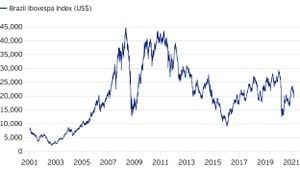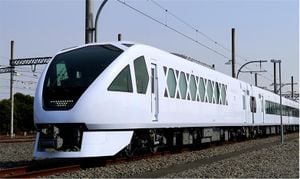Karol Nawrocki, the President of the Institute of National Remembrance (IPN) and presidential candidate for the ruling Law and Justice party (PiS), faces scrutiny after reports emerged detailing his extravagant travel expenses, amounting to nearly 800,000 PLN. According to Gazeta Wyborcza, the financial burden of these trips, which spanned multiple continents, has raised eyebrows among taxpayers and political rivals.
Throughout his time as the head of the IPN and previously as the director of the Museum of the Second World War, Nawrocki undertook numerous international journeys. The costs accumulated from his travels totaled approximately 463,000 PLN during his museum tenure and over 326,000 PLN as president of the IPN. Among his more notable travel destinations were Hawaii, Japan, China, Australia, and New Zealand. The trips continued as he visited countries like Zimbabwe, Mexico, and Argentina, along with various locations across the United States.
IPN has responded to the allegations of excessive spending with claims of necessity. The Institute asserted, "Many tasks cannot be performed remotely and require the presence of IPN representatives, so why wouldn't it be the President?" This argument emphasizes the importance of establishing international relations and collaborating with similar organizations worldwide, following tasks outlined by Polish law.
Despite the justifications provided, Nawrocki's extensive travel record has not escaped criticism. MP Jaskulski remarked, "Kampania wyborcza to taki czas, w którym poznajemy bliżej kandydatów, ich zainteresowania, pasje, hobby," implying Nawrocki's apparent passion for travel at the expense of taxpayers. The consecutive journeys can be construed as having formed what Jaskulski whimsically described as the "Instytut Podróżowania Nawrockiego" or “Nawrocki’s Travel Institute.”
Questions about the purpose behind such expenditures have become points of contention among lawmakers. MP Witczak pointedly questioned, "Shouldn't he explain these expenditures, as he didn't spend any of his own money, yet traveled extensively?" The implication here is clear: with state funding these international ventures should yield tangible benefits for Poland.
Rafał Trzaskowski, Nawrocki's leading opponent for the presidential seat, weighed in on the controversy, urging Nawrocki to justify the necessity of these exotic trips. "It’s up to Nawrocki and the IPN to explain the purpose of these journeys," Trzaskowski stated, reinforcing the call for transparency during this election season.
Public sentiment appears to be shifting as these revelations about Nawrocki's spending fuel uncertainty about his credibility as a candidate. Recent polling data highlighted by Super Express indicates troubling signs for Nawrocki, showing him trailing behind Trzaskowski with only 25% approval compared to Trzaskowski's 35%. This disparity highlights not only potential dissatisfaction with Nawrocki's campaign but also reflects broader concerns about accountability among politicians.
Overall, Karol Nawrocki's candidacy is now under intense scrutiny, and as the presidential election approaches, voters are increasingly aware of his past spending practices, with many questioning their appropriateness and the overall impact on Poland's governance. Will Nawrocki manage to sway public opinion back in his favor, or will these travel expenses become a deciding factor for voters? Only time will tell, but one thing is for sure: for many, Nawrocki's travel ledger complicates his path to Poland's presidency.



